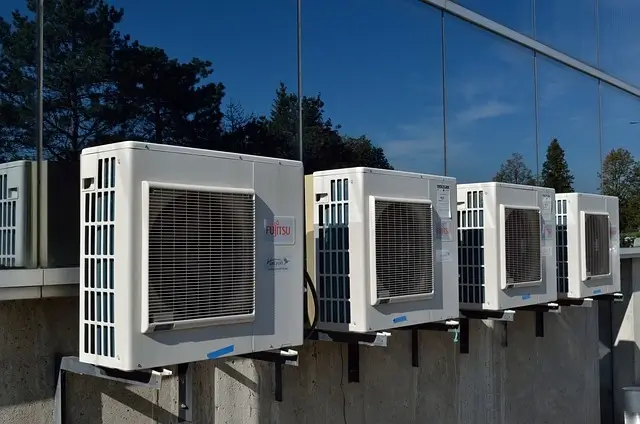Have you ever been blindsided by an unexpected HVAC breakdown? These disruptions can be costly and uncomfortable, impacting both your budget and your building’s atmosphere. Effective HVAC maintenance is more than a preventative measure—it’s a step towards optimal efficiency, lower costs, and comfortable surroundings.
In this article, you’ll discover the 10 essential tips and practices that will help you keep your commercial HVAC system performing at its best. With these strategies, you can turn unexpected breakdowns into a thing of the past.
1. Establish A Regular Inspection Schedule
A comprehensive inspection of the HVAC system forms the backbone of an effective maintenance strategy. Regular check-ups, preferably every month, will help in identifying minor issues before they escalate into significant problems. Regardless of your HVAC unit size, a professional technician can inspect various components, including filters, coils, belts, motors, and thermostats, to verify their efficient operation.
2. Prioritize Filter Replacement
Filter replacement is a crucial aspect of HVAC maintenance that you cannot overlook. Dirty filters impede airflow, forcing the system to work harder and consume more energy. Generally, filters should be replaced every one to three months, depending on usage and environment. In high-dust areas, monthly replacements might be necessary.
3. Lubricate Moving Parts
Regular lubrication is integral to HVAC system maintenance. Motors and bearings are some components of an HVAC system that require lubrication to reduce friction and prevent overheating. Neglecting this can lead to system failure and expensive repairs.
Here’s a quick guide on how to tackle this:
Identify Parts That Need Lubrication: The most common parts that need regular lubrication include the blower motor and bearings. Knowing which parts need lubrication helps you take a targeted approach.
Use The Right Lubricant: Not all lubricants work for all parts. It’s crucial to use the right type and quantity of lubricant as specified by the manufacturer. Improper or excessive lubrication can be just as damaging as no lubrication.
Schedule Regular Lubrication: Depending on usage and manufacturer recommendations, certain parts might need to be lubricated more often than others. As a rule of thumb, include lubrication in your routine maintenance schedule.
Through these steps, you can effectively reduce friction and prevent overheating in the moving parts of your HVAC system, ensuring it operates efficiently and lasts longer.
4. Keep Coils Clean
Like filters, dirty coils can hamper your HVAC system’s performance. Dirt and debris on evaporator and condenser coils make the heat exchange process less efficient, resulting in increased energy consumption. Regular coil cleaning can help maintain optimal efficiency and prolong the lifespan of your system.
5. Monitor and Maintain Ductwork
Ducts are the conduits that distribute conditioned air throughout your building. If they’re leaky or poorly insulated, they could waste up to 30% of your conditioned air. Regular inspections for leaks and necessary insulation can ensure maximum efficiency in your HVAC system.
6. Check the Thermostat
Your HVAC system’s thermostat plays a critical role in maintaining a comfortable environment. Inaccurate thermostat settings can result in wasteful energy use. It’s advisable to check the thermostat calibration during routine maintenance and consider upgrading to a programmable thermostat for more precise control.
7. Train Staff in Basic Maintenance
While professional maintenance services are crucial, training your staff on basic HVAC maintenance can make a big difference. Staff can clean or replace filters, check thermostat settings, and identify and report issues that need professional attention.
8. Adopt A Preventative Maintenance Plan
Rather than waiting for a system breakdown, implementing a preventative maintenance plan can help catch issues early and ensure the system operates at peak efficiency. This plan should involve routine inspections, cleaning, and repairs as necessary.
9. Prioritize Energy-Efficiency Practices
Increasing the energy efficiency of your HVAC system can lead to significant cost savings. This could involve installing energy-efficient equipment, utilizing programmable thermostats, and encouraging energy-saving habits among staff, such as turning off the HVAC system when the building is unoccupied.
10. Consider Professional Maintenance Services
Engaging professional HVAC maintenance services brings immense value to your maintenance strategy. These experts come with a deep understanding of HVAC systems, spotting problems that untrained eyes might miss. Here are some benefits:
Comprehensive Assessment: Professionals conduct a thorough assessment of the entire HVAC system, including parts that may not be easily accessible, ensuring that every component is in good condition.
Quality Repairs and Replacements: If any part of the HVAC system requires repair or replacement, professional technicians have the necessary tools and expertise to handle the job accurately and safely.
Safety Assurance: HVAC systems can be complex and potentially dangerous if not handled correctly. Professionals understand these risks and take appropriate measures to mitigate them, ensuring safety for all building occupants.
Incorporating professional services into your maintenance plan can improve your HVAC system’s efficiency, extend its lifespan, and save on potential future costs.
Conclusion
Maintaining your HVAC system diligently ensures the efficiency, comfort, and safety of any commercial building. By implementing these tips, you prevent costly repairs, prolong your system’s lifespan, and ensure optimal performance. Moreover, these practices reflect your commitment to sustainability and fiscal responsibility. So, keep your HVAC systems in optimum condition and let them contribute silently to your organization’s overall success.

I manage a family restaurant in Bloomington, and with summer almost over soon, I was thinking of having our HVAC system serviced soon to prepare for the upcoming cold months, especially with how hard it was working to keep the restaurant cool these past three months. I appreciate your advice when you told us to get a comprehensive assessment done on our HVAC system by getting experts to thoroughly check each part and make sure everything is in good condition. I’ll keep this in mind while I look for an HVAC company in Bloomington to hire for help soon with my restaurant’s HVAC system.